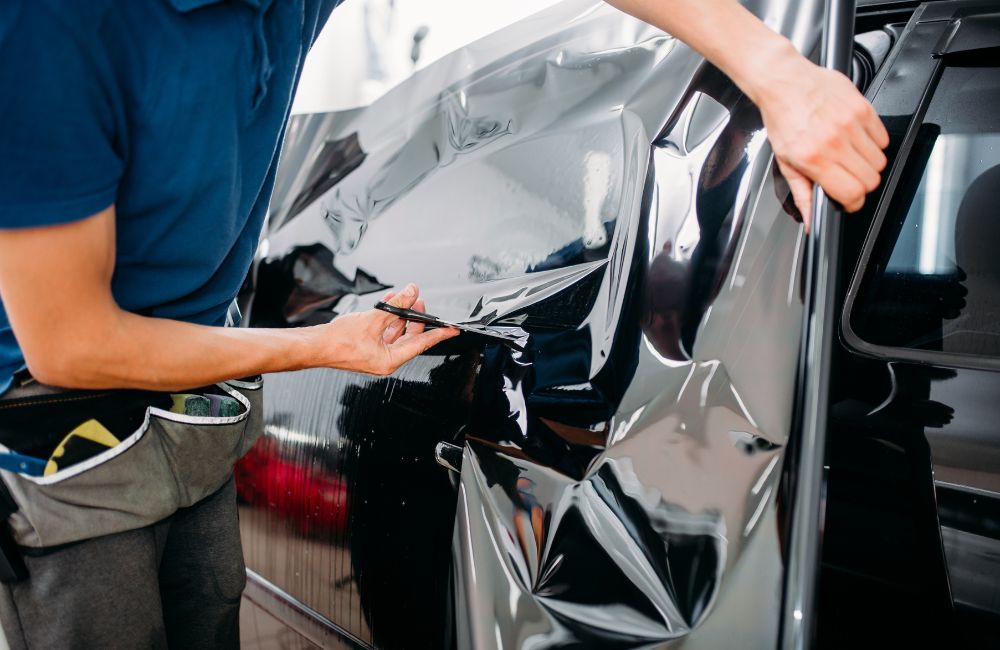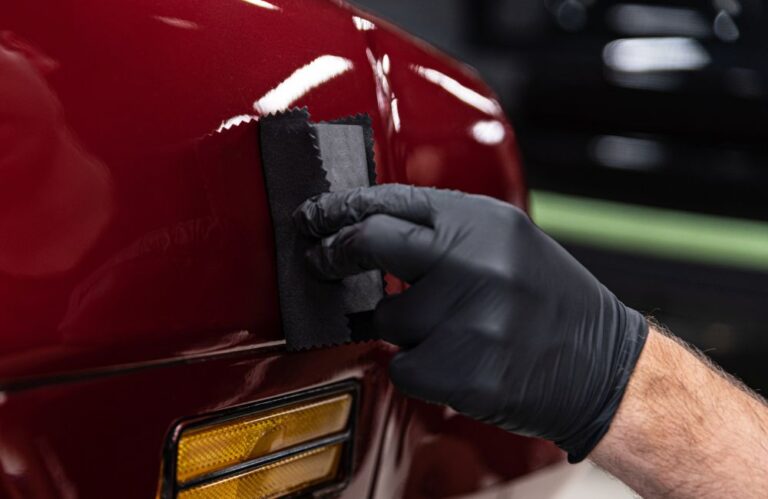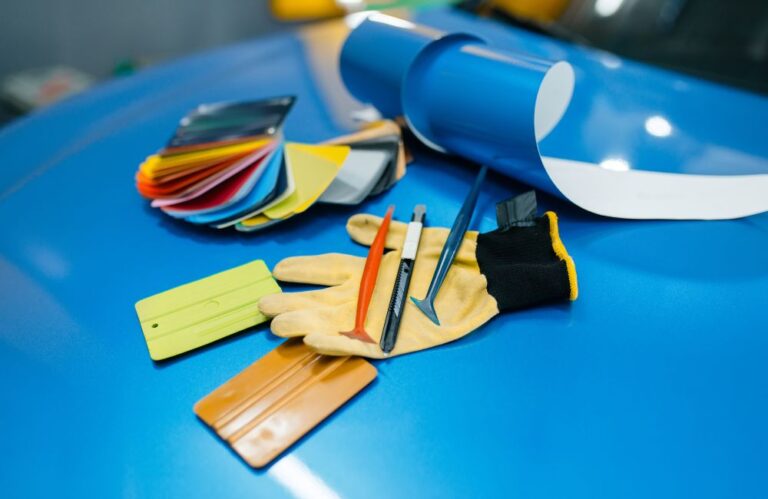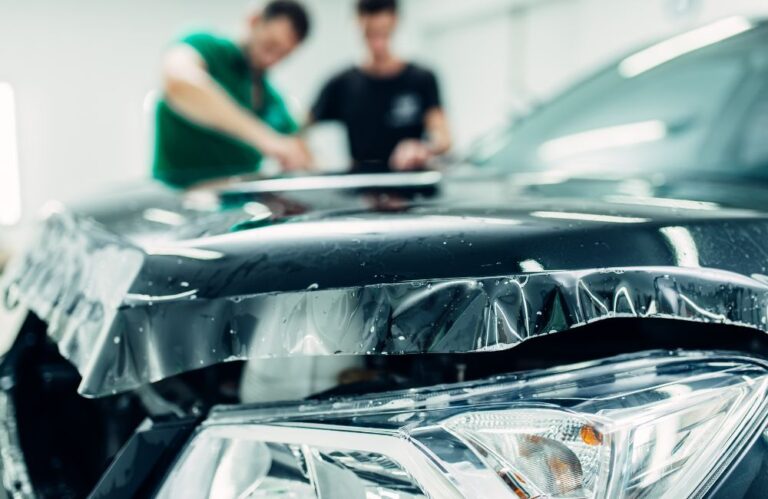Table of Contents
Key Takeaways
Introduction
What are Vinyl Wraps?
What is a Car Paint Job?
Vinyl Wrap vs. Paint: Which Is Better for Your Car?
In Comparison: Vinyl Wrap vs Paint
Which One Should You Choose?
How to Identify Reliable Wrap and Paint Professionals
Frequently Asked Questions
| Key Takeaways ✔ Vinyl wrap offers versatility with various colors and textures, while paint provides a durable and timeless finish. ✔ Vinyl wrap is easily removable without damaging the original paint, while paint offers precise color matching and a high-gloss appearance. ✔ Vinyl wrap allows for intricate designs and graphics, while paint delivers unmatched longevity and aesthetic refinement. ✔ Vinyl wrap is generally more cost-effective and offers easier customization options, while paint requires a professional application for optimal results. ✔ The choice between vinyl wrap and paint depends on factors such as desired durability, customization preferences, budget, and application requirements. ✔ By following comprehensive steps and conducting thorough research, you can confidently identify reliable wrap and paint professionals with the expertise to bring your vision to life. |
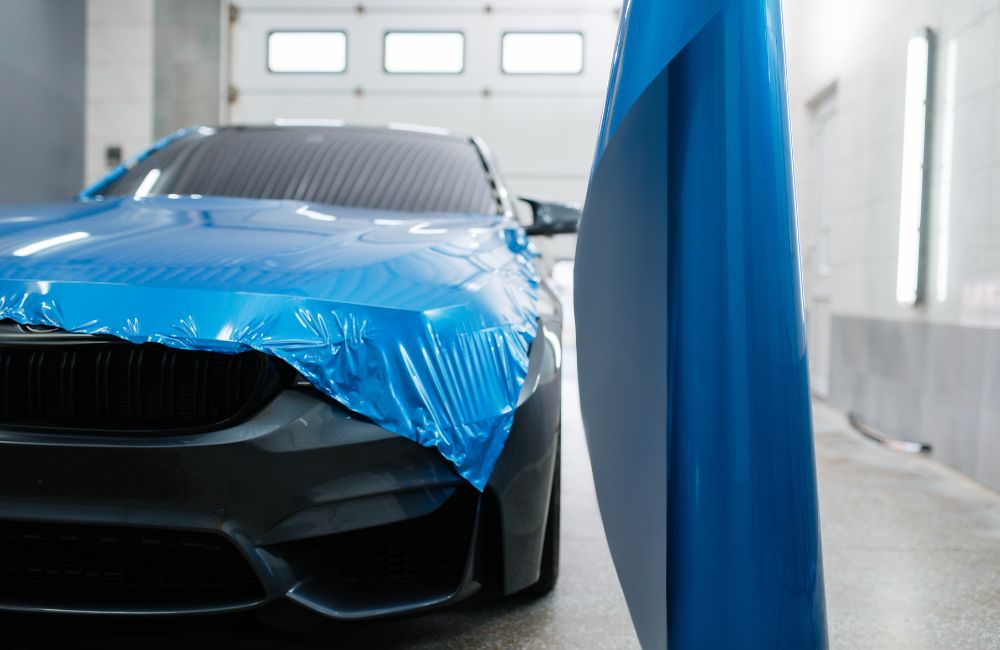
With vehicle wraps gaining considerable traction, statistics underscore their effectiveness: the average lifespan for vehicle wraps is five to seven years, and they reach 92% of U.S. residents, generating up to 600 impressions per mile. Consequently, individuals are more inclined to have their cars wrapped. The question arises: which option—vinyl wrap or paint—is better suited to meet your needs?
What are Vinyl Wraps?
Vinyl wraps are a versatile solution for transforming the appearance of various surfaces, primarily vehicles, walls, furniture, and more. Essentially, vinyl wraps are large sheets of vinyl film that adhere to surfaces through heat and pressure. They offer various benefits, making them a popular choice for personal and commercial applications.
Types of Vinyl Wraps
- Cast Vinyl: Cast vinyl is a premium type of vinyl wrap known for its flexibility and durability. It’s made through a casting process where liquid vinyl is poured onto a backing material and then cured. This results in a thin, conformable film that can adhere to complex curves and contours, making it ideal for vehicle wraps. Cast vinyl also has better longevity and color retention than other types.
- Calendered Vinyl: Calendered vinyl is a more economical option made through a calendaring process where the vinyl is extruded through rollers. While it’s less expensive than cast vinyl, it’s also thicker and less conformable. Calendered vinyl is suitable for flat or slightly curved surfaces and is often used for short-term applications like promotional signage or temporary vehicle graphics.
Pros of Vinyl Wraps
- Customization Options: Vinyl wraps offer an extensive range of colors, finishes, and textures, allowing for virtually limitless customization possibilities. Whether you prefer a glossy, matte, satin, or textured finish, there’s a vinyl wrap to suit your style.
- Protection Against External Elements: Vinyl wraps provide a layer of protection for the underlying surface, guarding against minor scratches, stone chips, and UV exposure. This helps preserve the original paintwork of vehicles and can extend their lifespan.
- Reversibility and Ease of Updating: One of the significant advantages of vinyl wraps is their reversibility. Unlike traditional paint jobs, vinyl wraps can be removed without causing damage to the underlying surface, allowing for easy updates or changes to the vehicle’s appearance. This makes vinyl wraps an excellent choice for leased vehicles or individuals who enjoy regularly refreshing their vehicle’s look.
Cons of Vinyl Wraps
- Durability Concerns Compared to High-Quality Paint: While vinyl wraps offer decent durability, they may not be as resilient as high-quality automotive paint. Harsh environmental conditions, such as extreme heat or prolonged exposure to sunlight, can accelerate wear and cause the vinyl to fade or peel over time.
- Installation Expertise Required: Achieving a flawless vinyl wrap installation requires skill and experience. Improper installation can lead to issues like bubbling, wrinkles, or visible seams. Therefore, it’s essential to entrust the installation to trained professionals to ensure optimal results.
What is a Car Paint Job?
A car paint job involves applying layers of specialized paint to the surface of a vehicle, creating a protective and aesthetically pleasing finish. Traditional automotive painting processes require meticulous preparation, skillful application, and careful curing to achieve the desired results.
The process typically begins with thorough preparation, including cleaning, sanding, and priming the vehicle’s surface to ensure proper adhesion of the paint. Once prepped, the vehicle is masked off to protect areas not intended for painting. Next comes the application of multiple coats of paint, followed by clear coat layers to enhance gloss and durability. Finally, the paint undergoes curing, either through air drying or baking in a controlled environment, to achieve a durable finish.
Types of Automotive Paint
- Standard Paint: Standard automotive paint consists of a base color coat topped with a clear coat for added protection and shine. It provides a solid, uniform color finish and is commonly used for most vehicles.
- Metallic Paint: Metallic paint contains small metallic particles that reflect light, giving the finish a shimmering effect. Metallic paints add depth and dimension to the color, enhancing the vehicle’s appearance under different lighting conditions.
- Pearlescent Paint: Pearlescent paint incorporates special pearlescent pigments that produce a lustrous, iridescent finish. This type of paint creates a unique color shift effect, with hues changing depending on the viewing angle and lighting conditions.
Pros of Paint
- Longevity and Durability: A high-quality paint job, when properly maintained, can last for many years. This provides durable protection against environmental factors such as UV radiation, moisture, and road debris.
- Potential for Increasing Vehicle Resale Value: A professionally executed paint job can enhance the overall aesthetics of a vehicle, potentially increasing its resale value. A well-maintained paint finish reflects positively on the vehicle’s care and maintenance history.
- Depth of Color and Customization Options: Traditional automotive paint offers a wide range of colors and custom mixing options, allowing owners to achieve their desired hues and finishes. The depth and richness of color contribute to the vehicle’s visual appeal and personalization.
Cons of Paint
- Cost of High-Quality Paint Job: A high-quality automotive paint job can be expensive, especially when using premium paints and professional services. The cost includes materials, labor, and additional services such as surface preparation and clear coat application.
- Time-Consuming Process: Achieving a flawless paint finish requires patience and time. The entire painting process, from preparation to curing, can take several days or even weeks, depending on the complexity of the job and drying/curing times.
- Permanency: Unlike vinyl wraps, which offer reversibility and easy updates, traditional paint is a permanent alteration to the vehicle’s exterior. This may be a drawback for individuals who prefer to change their car’s look frequently or want the option to revert to the original finish.
Vinyl Wrap vs. Paint: Which Is Better for Your Car?
When deciding between vinyl wrap and paint for your car, understanding the current market trends and material properties can guide you to make the best choice. According to data, the automotive wrap films market is on a rapid ascent, projected to reach USD 4.32 billion by 2028, growing at a compound annual growth rate (CAGR) of 18.8%.
This surge is fueled by rising consumer interest in customizing vehicles to stand out. Additionally, there is an increased commercial use of medium-duty vehicles like food trucks, which often utilize wraps for protection and advertisement. Such trends indicate a strong consumer and business preference for wraps over traditional paint.
In Comparison: Vinyl Wrap vs Paint
| Feature | Vinyl Wrap | Paint |
| Color Options | Extensive range of colors, finishes, and textures. Custom color matching available. | Precise color-matching to desired shade. Limited by availability of paint colors. |
| Finish and Texture | Offers diverse finishes (matte, glossy, satin) and a variety of textures (carbon fiber, brushed metal). | Typically offers smoother and more seamless finishes with options like metallic or pearl effects. |
| Removability | Easily removable without damaging the original paint, suitable for leased vehicles or frequent changes. | Permanent, requires professional removal if change is needed. |
| Protection | Acts as a protective layer against minor scratches and chips, easy to repair if damaged. | More durable and offers better resistance to scratches, chips, and abrasions. |
| Cost | Generally less expensive due to lower material and labor costs. Quick installation. | More expensive due to higher material costs and labor-intensive application. |
| Customization | Allows for intricate custom graphics and designs. Non-permanent, can be changed or updated easily. | Customization is possible but limited to paint techniques and finishes. Requires skilled artists for intricate designs. |
| Aesthetic Appeal | Wide range of visual customization can be achieved; however, may have visible seams or imperfections depending on installation. | Provides a higher level of gloss and depth, with a seamless appearance enhancing aesthetic appeal. |
| Durability and Maintenance | Less durable than paint; however, it provides a buffer against superficial damage. Maintenance is more straightforward and economical. | Superior durability and resistance to environmental factors. Maintenance involves regular waxing and polishing. |
| Professional Application Needed | Can be applied by enthusiasts with some experience; professional application recommended for best results. | Requires professional application with specialized equipment and knowledge for a flawless finish. |
Which One Should You Choose?
Deciding between a vinyl wrap and paint for your car involves considering several factors such as your budget, the intended duration of the customization, aesthetic preferences, and how you use your vehicle.
Here are some common scenarios to help guide your decision:
Choose Vinyl Wrap If
- You Enjoy Regular Changes. Opt for a vinyl wrap if you like updating your car’s appearance frequently or seasonally. Vinyl wraps offer flexibility and can be removed or changed without permanent alterations to your car’s original paint.
- You Use Your Vehicle for Business. If your car doubles as a mobile advertisement, vinyl wraps are perfect. They allow you to apply and change business branding easily without damaging the underlying paint, making it ideal for promotional or seasonal advertising.
- You Want Custom Graphics. Vinyl wraps excel in providing an array of custom designs, textures, and colors that are not easily achievable with traditional paint. This makes them suitable for personalized or branded vehicle designs.
- You Seek a Cost-Effective Solution. Generally, vinyl wraps are less expensive than a full high-quality paint job. They can also serve as a protective layer to maintain the underlying paint, potentially enhancing the resale value of the vehicle.
- Environmental Concerns. If you’re looking for an eco-friendlier option, some vinyl wraps are made with less environmentally damaging materials than traditional paints and processes.
Choose Paint If
- You Prefer Durability. Choose a paint job if you’re looking for a long-term solution. Good quality paint, when properly maintained, can last the lifetime of your car and withstand environmental elements better than vinyl wraps.
- You Value Aesthetics. If you desire a classic look or a specific custom color with a deep, rich finish, paint can offer a depth and quality that wraps might not match. Paint also allows for blending and layering of colors that wraps cannot achieve.
- You Plan to Keep the Car Long-Term. Painting might be a better investment if you don’t intend to change your vehicle’s appearance frequently. A high-quality paint job can potentially increase the resale value of your car, appealing to buyers who value originality and durability.
- You’re Concerned About Long-Term Cost. While more expensive upfront, a quality paint job does not need to be replaced as often as a vinyl wrap might, potentially saving money in the long run.
- Eco-friendly Options. For those concerned about the environmental impact, advanced paint options are available that use waterborne paints with lower volatile organic compounds (VOCs) than traditional solvent-based paints.
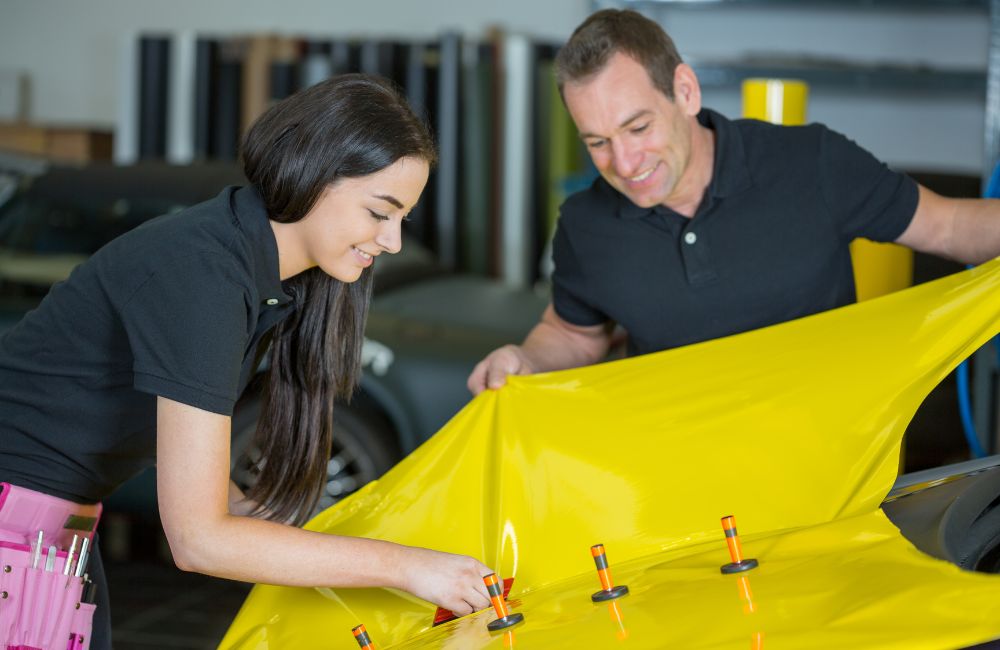
How to Identify Reliable Wrap and Paint Professionals
Transforming your car’s appearance through a vinyl wrap or a fresh paint job is an exciting endeavor, but it’s essential to entrust this task to reputable professionals who can deliver outstanding results. Here’s a closer look at how to identify reliable wrap and paint professionals in NY:
Research Online
Begin your search by exploring online platforms such as search engines, business directories, and social media. Focus on businesses with comprehensive websites that showcase their services, portfolio, and contact information. A well-maintained online presence often reflects a commitment to professionalism and customer satisfaction.
Check Reviews and Testimonials
Dive into customer reviews and testimonials to gain insight into the experiences of past clients. Platforms like Google Reviews, Yelp, and Facebook provide valuable feedback on aspects such as the quality of workmanship, adherence to deadlines, communication, and overall satisfaction. Pay attention to recurring themes and trends in the reviews to gauge the consistency of service quality.
Verify Certifications and Qualifications
Look for wrap and paint professionals who hold relevant certifications or memberships in industry organizations. These credentials demonstrate a commitment to upholding industry standards and staying updated on the latest techniques and best practices. Additionally, certifications from reputable manufacturers may indicate expertise in handling specific materials or products.
Examine Portfolios
Take the time to review the portfolios of prospective professionals in NY to assess the breadth and quality of their work. Look for examples that align with your aesthetic preferences and project requirements. Pay attention to the level of detail, precision, and creativity showcased in their past projects. A diverse portfolio that includes various vehicle types, colors, and designs can indicate versatility and proficiency.
Inquire About Materials and Techniques
Ask about the materials, techniques, and equipment used by the professionals in their wrap or paint processes. Reputable providers prioritize quality by using premium-grade vinyl materials, industry-leading paints, and proven application methods. They should be knowledgeable about the latest advancements in materials technology and offer recommendations based on your preferences and goals.
Ask About Warranties and Guarantees
Inquire about the warranties and guarantees provided by the professionals to safeguard your investment. Reputable providers typically offer warranties covering issues such as material defects, color fading, and installation errors. Clear warranty terms demonstrate confidence in the quality of work and provide reassurance that any unforeseen issues will be addressed promptly and effectively.
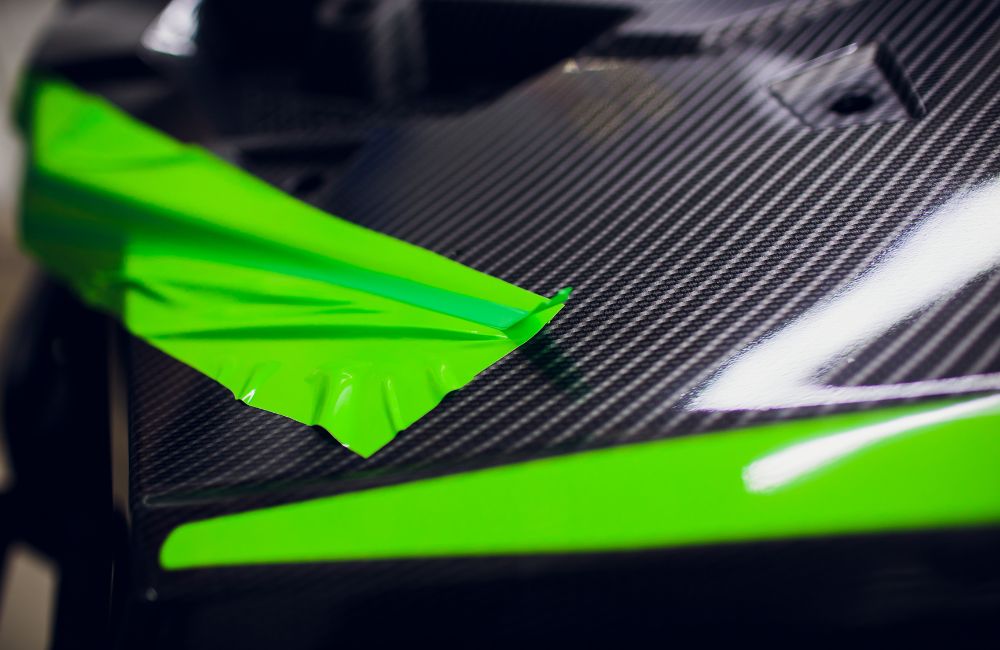
Frequently Asked Questions
Can I wash my car with a vinyl wrap?
You can wash a car with a vinyl wrap just like you would with a painted surface. However, it’s important to use gentle cleaning products and avoid abrasive materials or high-pressure washers that could damage the wrap.
How long does a vinyl wrap last?
The lifespan of a vinyl wrap depends on various factors such as the quality of the material, installation technique, and environmental conditions. Typically, a professionally installed vinyl wrap can last anywhere from 5 to 10 years.
Are vinyl wraps only for cars?
Vinyl wraps can be applied to various surfaces beyond vehicles. They are commonly used on boats, motorcycles, walls, furniture, electronics, and even architectural elements like buildings and signage.
Can vinyl wraps be applied to damaged or rusted surfaces?
It’s generally not recommended to apply vinyl wraps to damaged or rusted surfaces. The condition of the underlying surface can affect the adhesion and longevity of the wrap. It’s best to repair and prepare the surface properly before applying the vinyl wrap.
Do vinyl wraps affect the resale value of a vehicle?
Vinyl wraps can both positively and negatively impact the resale value of a vehicle. A well-maintained and tastefully designed vinyl wrap can enhance the aesthetic appeal and uniqueness of a vehicle, potentially increasing its resale value. However, poorly applied or outdated wraps may detract from the vehicle’s value.
Transform Your Vehicle Today with Car Wrap – Illmatic Wraps (NYC)!
Ready to give your vehicle a stunning makeover? Car Wrap – Illmatic Wraps (NYC)’s premier vinyl wrap installation experts, is here to enhance your car’s appearance, advertise your business on the go, protect your vehicle’s paint, and more! From sleek finishes to eye-catching designs, we specialize in delivering top-quality results that exceed expectations. Don’t wait any longer to elevate your ride — Car Wrap – Illmatic Wraps (NYC) today for a professional vinyl wrap installation experience like no other!

